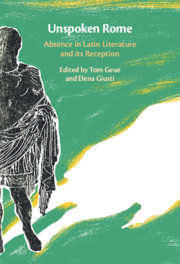Book contents
- Unspoken Rome
- Unspoken Rome
- Copyright page
- Contents
- Figures
- Unspoken Rome: Acknowledgements
- Contributors
- Introduction
- Part I Absence in Text
- Part II Absence in Context
- Chapter 7 Speaking Silence in Cicero’s Brutus and Tacitus’ Dialogus de Oratoribus
- Chapter 8 Et sine auctore notissimi uersus
- Chapter 9 Looking for the Emperor in Seneca’s Letters
- Chapter 10 Marcus Aurelius: Medi()ations Not Medi(c)ations
- Chapter 11 Lost in Germania
- Chapter 12 Conspicuous Absence
- Part III Going Beyond
- Afterword Lights Out
- Bibliography
- General Index
- Index Locorum
Chapter 12 - Conspicuous Absence
Tacitus’ De Re Publica
from Part II - Absence in Context
Published online by Cambridge University Press: 03 September 2021
- Unspoken Rome
- Unspoken Rome
- Copyright page
- Contents
- Figures
- Unspoken Rome: Acknowledgements
- Contributors
- Introduction
- Part I Absence in Text
- Part II Absence in Context
- Chapter 7 Speaking Silence in Cicero’s Brutus and Tacitus’ Dialogus de Oratoribus
- Chapter 8 Et sine auctore notissimi uersus
- Chapter 9 Looking for the Emperor in Seneca’s Letters
- Chapter 10 Marcus Aurelius: Medi()ations Not Medi(c)ations
- Chapter 11 Lost in Germania
- Chapter 12 Conspicuous Absence
- Part III Going Beyond
- Afterword Lights Out
- Bibliography
- General Index
- Index Locorum
Summary
Germania is read as a response to Caesar’s De Bello Gallico, and contrasted with Tacitus’ account of conquest in the Agricola. Focusing on the absence of historical narrative, discussion goes beyond the well-recognized denial of history to the Germanic Other to consider the implications of moments when Germania comes close to recounting history without doing so. Narrativity and the predominance of description are discussed, with a view to understanding Germania as epideixis. It is suggested that the absence of historical narrative emphasizes the vivid portrayal of Germania as unconquered territory, and that Germania provides a vivid exploration of the limits of Roman power and epistemologies. The text expresses an imperialist perspective, but does not claim a triumph for Roman ratio over a territory that is resistant to it.
- Type
- Chapter
- Information
- Unspoken RomeAbsence in Latin Literature and its Reception, pp. 219 - 236Publisher: Cambridge University PressPrint publication year: 2021

